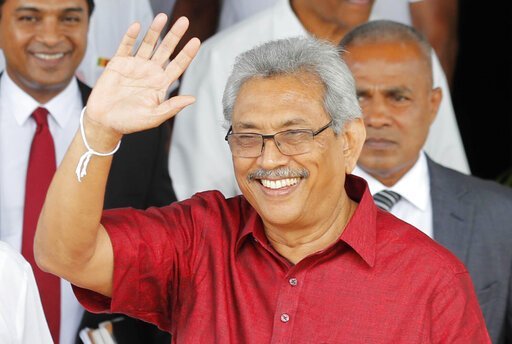October 30, 2019 (LBO) - Nandasena Gotabaya Rajapaksa appears to be the man of the moment. The 70 year old former Lieutenant Colonel in the Sri Lanka Army, turned American, returned as Defence Secretary is likely just weeks away from taking oaths and assuming office as the President of Sri Lanka. His journey to Sri Lanka's political apex has not been without obstacles.
Gotabaya Rajapaksa, much like his former President Donald Trump, has been the subject of one of Sri Lanka's most dubious political witch hunts. He and his associates have been investigated unceasingly by the Police, and charged by the Attorney General's department with a myriad of offences. Court cases were also filed in the United States in what seemed an effort to derail his Presidential candidacy.
Although he was born in Sri Lanka, and served in its military for over two decades, his citizenship was aggressively challenged in the courts.
A constitutional amendment was even passed to restrict dual citizens from becoming candidates for election in an attempt to keep him out of Sri Lanka's political sphere.
Under the duress of seemingly relentless persecution, and the fragility of being over 70 years old, Gotabaya Rajapaksa had to undergo open heart surgery in Singapore in the heat of this Presidential election cycle.
Despite these serious challenges, he seems to have remained firm in his resolve. He has successfully renounced his American citizenship, and run a serious, well organised, and disciplined political campaign. He has run this campaign in a political backdrop that for him is extraordinarily favourable.
Gotabaya has never before contested an election, and Sri Lanka is tiring of traditional politicians.
Sri Lanka has suffered a globally significant terrorist attack as a result of a Presidenital failure, and Gotabaya Rajapaksa is the Presidential candidate with by far the highest regarded national security credentials.
Sri Lanka's economy and development velocity is at stall speed, in part due to a clash between an erratic President and a fractured UNP government. Gotabaya Rajapaksa is seen as someone who can get things done, and lead a professional driven economic development thrust.
Gotabaya Rajapaksa's credentials, messaging, and organisation seems almost invincible in comparison to Sajith Premadasa's disorganised campaign that has failed to build a coalition and deliver a clear message. As postal voting commences, the lack of enthusiasm for Sajith from Tamil politicians is becoming apparent.
Gotabaya's campaign on the other hand recently traversed Jaffna, reaching out to its most unlikely supporters. The death blows appear to be being dealt.
The UNP needs to get ready to pick up the pieces from what is likely to be a devastating loss at the Presidential election. The loss to Gotabaya Rajapaksa is a loss to a man of the moment, and may not equate to a similar outcome at the Parliamentary elections where the names on the ballot will be very different. Parliamentary elections will be called in February at the earliest if the constitution is respected.
In the Parliamentary elections, votes will be splintered among many political parties who represent different constituents.
It is likely that a coalition will be necessary for any leader to command the confidence of Parliament and be appointed by the President as the next Prime Minister.
The UNP, under its leader Ranil Wickremesinghe, can build a formidable coalition. If it is not big enough to form a government, it can at the minimum be a very credible opposition. The UNP needs to pivot back to Ranil Wickremesinghe's brand of minority friendly, inclusive coalition politics based on shared liberal and democratic values. The Sajith Premadasa experiment, with roots in populism and nationalism, is simply one that is not working.
The UNP has made a significant mistake in its Presidential campaign and this needs to be acknowledged and dealt with. The party needs to reverse course.
There is a Parliamentary General Election coming in the next few months, and a Presidential election again at the end of 2024.
In order to be competitive, the UNP needs to unify and regroup in order to present a credible and differentiated alternative in the next Parliamentary and Presidential elections.
Until that time, all political leaders should make best efforts to work closely with Gotabaya Rajapaksa for the betterment of the nation.
Ranil Wickremesinghe has an important role to play, as his experience and international credibility will allow him to counterbalance the Rajapaksa machine. He has the stature and is ideally suited to work productively with Gotabaya Rajapaksa as the Prime Minister or Opposition leader. Political leaders in Sri Lanka must be prepared to work together. The confrontational politics of the last few years has cost Sri Lanka far too much and must not be repeated.

